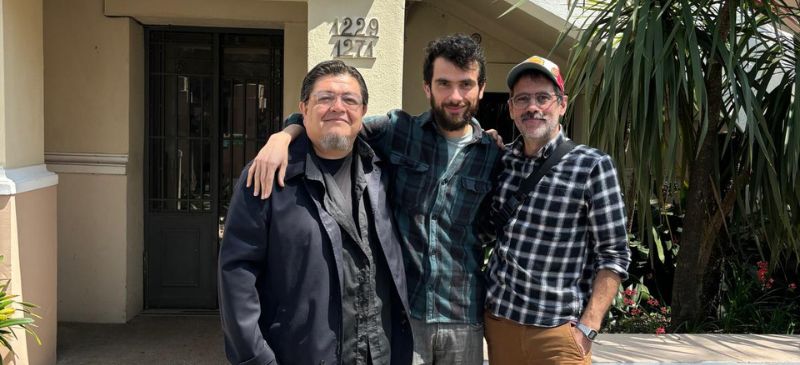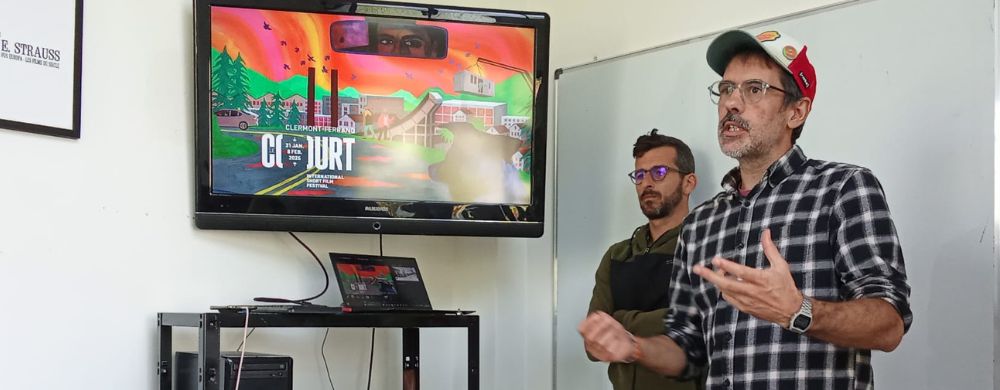- Home
- About us
- News
- Events
- EXPORT Export
-
BUY
Buy
BuyBuyFood and beverage Beef Caviar Dairy Products Fruits Healthy foods Olive oil Processed Foods Rice Sweets, honey and jams Wines ICT Software development Technology products
- INVEST Invest
- COUNTRY BRAND Country Brand
-
INFORMATION CENTER
Information center
InformationCenterInformationCenterReports Country reports Department reports Foreign trade reports Product-Destination worksheet Sectors reports Work documentsStatistical information Classification Uruguay XXI Exports Imports Innovative National Effort Macroeconomic Monitor Tools Buyers Exporters Investors
- Contact
-
Languages
Detour: Uruguay Strengthens Its Audiovisual Industry on the Global Stage for International Experts
French festival juror Fabien de Macedo and Jaime Manrique from Colombia praised the quality and uniqueness of Uruguayan cinema.
Share:

Uruguay XXI reaffirmed its commitment to promoting the national audiovisual industry by supporting the second edition of the Detour Festival’s Sustainable Film Forum. It also facilitated the participation of two renowned international jurors: Fabien de Macedo, linked to the French short film festival Clermont-Ferrand, and Jaime Manrique, founder of the Colombian festival Bogoshorts and director of Black Velvet Laboratories.
Both experts, invited by Uruguay XXI, were not only part of the jury in different categories but also gave talks on sustainability in the audiovisual sector aimed at key players in the Uruguayan industry. In an interview with Uruguay XXI, they offered their vision of Uruguay and its cinema and their perspective on the country’s role in the international market.
De Macedo commented on his first visit to Latin America and how this experience allowed him to delve into Uruguay’s film culture. “Montevideo has many similarities with Europe, but at the same time, it’s not like Paris or the big capitals. It’s a quiet city; you feel at peace,” he said, highlighting the architectural beauty of the capital.
In the cinematographic field, he noted a growth in the presence of Uruguayan cinema in international festivals, specifically in Clermont-Ferrand, where presentations have doubled in recent years. “Years ago, we used to receive five or six Uruguayan films, and for the last two years, we have received more than a dozen. That means that there is an increasingly active production or that more and more is being exported,” he explained.
De Macedo, a musician, judged the video clip category and was impressed by the quality of the local productions. He especially highlighted the work of emerging artist Dais. “I might be interested in working with this Uruguayan artist,” he said.
He also underlined the shared interest of Uruguay and France around sustainability in audiovisual production, a value increasingly present in the film scene of both countries. “Uruguay has the same approach to sustainability as France. They are already working on the same questions we are,” he reflected.

For his part, Jaime Manrique also expressed his admiration for the Uruguayan audiovisual scene and the technical level of its productions. “The first international projects that started attending the Bogoshorts market were Uruguayan. That gave me some perspective that different things are happening to this small country,” he said.
Manrique, who had already had contact with Uruguayan short film projects, identified in the country a curious duality between the authorial, recalling emblematic works such as the film Whisky by directors Juan Pablo Rabella and Pablo Stoll and the influence of filmmakers such as Fede Álvarez, who has achieved success in Hollywood and recently released Alien: Romulus.
Manrique emphasized Montevideo’s tranquility and safety, especially compared to other major Latin American cities. He believes this sense of peace manifests in Uruguayan productions’ introspective and occasionally fantastical tone.
The two jurors agreed that Uruguayan cinema is at an exciting point of growth and predicted an explosion of opportunities in the near future. For Manrique, the country’s potential will be boosted with the arrival of the Ventana Sur festival in Uruguay, an event that will project Uruguay even further on the industry map. “Cinematographies are not built only by works and authors. Uruguay is achieving an international presence, which is key,” he said.
Both jurors, with experience in evaluating productions from different countries, agreed on the transparency and professionalism that characterize the Uruguayan industry. “The Detour jury process seemed to me to be a super well-established thing,” said Manrique, underscoring Uruguay’s commitment to a clean and reliable system. De Macedo, for his part, expressed his interest in continuing to promote access to Uruguayan cinema in Europe to provide further visibility to the country’s productions.
“Uruguay has the same approach to sustainability as France. They are already working on the same questions we are” Fabien de Macedo
